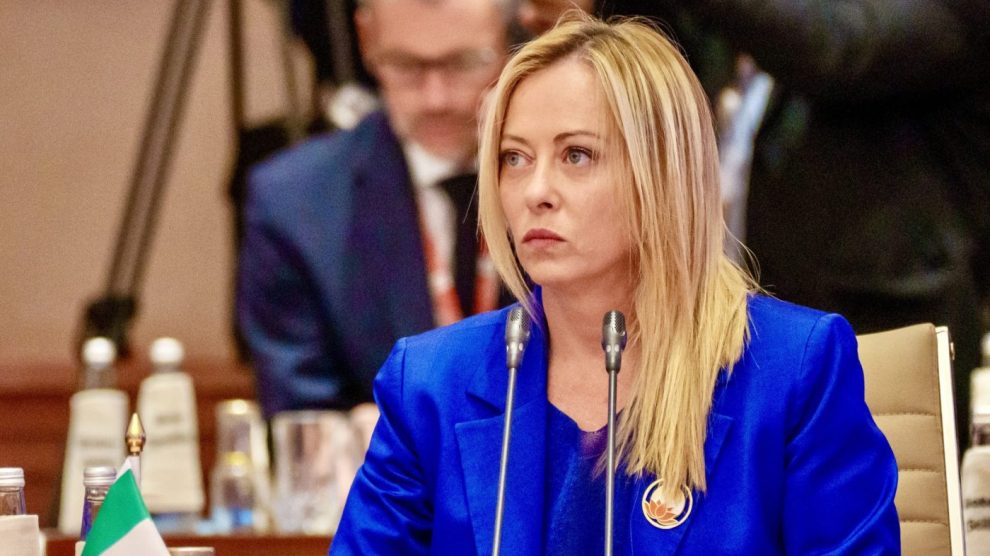Swapping silk for cotton. The G-20 delegations left New Delhi on Sunday after an intense two-day process that set the stage for many tangible deliverables. Among them was the launch of the India-Middle East-Europe Economic Corridor (IMEC), a massive rail and sea infrastructure network to create a commercial corridor (suitable for both energy and goods) from the Indian subcontinent across the Arabian peninsula all the way to Europe.
- The IMEC could speed up trade between India and Europe by 40% and help normalise relations between Israel and the Gulf states, which the White House has been pushing for.
- Indian Prime Minister Narendra Modi said the corridor is poised to be “a beacon of cooperation, innovation, and shared progress”. United States President Joe Biden said it was a “game-changing investment,” while European Commission President Ursula von der Leyen described it as “a green and digital bridge across continents and civilisations.”
Does it remind you of anything? The IMEC closely resembles (and looks poised to rival) the concept of China’s own Silk Road, aka Belt and Road Initiative. Except this Indo-Arabic-European corridor has the full backing of both the European Union and the United States and stands to provide an alternative to China’s global power project.
- President Biden cited the Cotton Road among Washington’s many agreements with Indo-Pacific countries while in Vietnam, where he elevated the partnership with the US to strategic…
- … and his presence is also felt in Saudi Arabia striking an agreement with India on Monday to build the IMEC.
Rome-Washington teamwork… As one of the founding partners, Italy finds itself at the centre of the Cotton Road launch. As it worked to exit the BRI, the Italian government was also deeply involved in the creation of what it sees as an “Indo-Mediterranean bridge to the Atlantic,” according to La Stampa. And the entente between President Biden and Italian Prime Minister Giorgia Meloni provided the support for the move.
- The coordination between Rome and Washington is evidenced by instances like the late August meeting between Francesco Talò, diplomatic advisor to Prime Minister Giorgia Meloni, and Jake Sullivan, national security advisor to President Joe Biden, after which Washington praised Italy’s “increased engagement across the Indo-Pacific.”
- Though they did not meet bilaterally at the G-20 in New Delhi, the Italian PM and US President met in late July to discuss overlapping dossiers.
- The IMEC also doubles as a material incarnation of the Partnership for Global Infrastructure and Investments, a collaborative effort by G-7 countries to finance infrastructure projects in developing countries…
- …which in turn is based on the principles of trust of the Blue Dot Network, a joint project between the US, Japan and Australia that focuses on high-quality infrastructure investments; President Biden has already welcomed Italy’s intention to join the steering committee.
… and the Mediterranean-India axis. The excellent relationship between Indian Prime Minister (and G-20 host) Narendra Modi and PM Meloni was also key to the IMEC’s creation. The two leaders had upgraded their country’s relations to “strategic” when they met in March. Then the Italian PM then stopped in the United Arab Emirates and met with Israeli PM Benjamin Netanyahu in Rome in the following days – shoring up ties with countries along the IMEC.
- These exercises in consolidation also translated to Italy lifting its arms sales ban on the UAE (and Saudi Arabia). Paired with New Delhi removing Italy’s defence giant Leonardo from its black list in 2021 – and considering that the other Italian defence titan, shipbuilder Fincantieri, is well-integrated in the Indian market –, all this amounts to removing frictions for transport, tech and defence commerce along the new corridor.
- Italy can” play a decisive role” in IMEC “thanks also to the strength of its companies in the maritime and rail sectors,” said PM Meloni.
- This, in turn, is just one of the facets of Rome’s push to increase cross-sector cooperation in the so-called “Indo-Abrahamitic construct” – a geostrategic connection system that is being built between the Indo-Pacific and the enlarged Mediterranean, featuring India and the UAE, as well as Israel and the US (and possibly Italy?) as central players.
What of China? Beijing has already voiced its opposition to the IMEC, which it sees as part of a US project to “contain” China. In Hanoi, President Biden disputed that; “I just want to make sure that we have a relationship with China that is on the up and up, squared away, everybody knows what it’s all about,” he said.
- Beijing propaganda had used similar claims to describe Rome’s decision to exit the BRI. But Italy and China still intend to expand cooperation – as emerged from PM Meloni’s meeting with her Chinese counterpart, Li Quiang, on the sidelines of the G-20 meeting.




